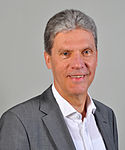Mecklenburg-Vorpommern state election, 2016
|
|
|||||||||||||||||||||||||||||||||||||||||||||||||||||||||||||||||||||||||||
|
|||||||||||||||||||||||||||||||||||||||||||||||||||||||||||||||||||||||||||
|
|||||||||||||||||||||||||||||||||||||||||||||||||||||||||||||||||||||||||||
|
|
|||||||||||||||||||||||||||||||||||||||||||||||||||||||||||||||||||||||||||
| Constituency results. | |||||||||||||||||||||||||||||||||||||||||||||||||||||||||||||||||||||||||||
The Mecklenburg-Vorpommern State Elections, 2016 were held on September 4, 2016 to elect members to the 7th Landtag of Mecklenburg-Vorpommern. All 71 seats in the Landtag were contested and around 1.3 million voters were eligible to cast ballots. Postal voting began in August ahead of the September 4 polling day. State elections in Mecklenburg-Vorpommern use the Hare-Niemeyer method of proportional representation to allocate seats in the Landtag.
The governing grand coalition between the SPD and CDU was campaigning to defend its majority. Furthermore, the result of the right wing AfD party was eagerly awaited. During the campaign, its frontrunner, Leif-Erik Holm, warned of the "spread of Islam". The party hoped to be the strongest political force after the elections.
Asked for the most important issues, Forschungsgruppe Wahlen/Politbarometer pollees ranked "unemployment" on first place (38%), followed by "refugees/asylum" (25%) and "school/education" (12%). Incumbent Erwin Sellering (64%) was far more popular as a candidate for Minister President than the CDU candidate Lorenz Caffier (18%). In an infratest dimap poll, however, 34% named "refugees/migration" as the top issue, followed by "social justice" (27%) and "labor and economy" (20%).
...
Wikipedia




